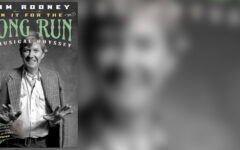
Over the years it’s been known as Fueding Banjos or Fussing Banjos, but more commonly Dueling Banjos, especially since the release of the film, Deliverance, in 1972 in which it was featured under that name.
Arthur Smith, who wrote the tune in 1955, passed away yesterday (4/3/14) at the age of 93. He had called the tune Feudin’ Banjos, and recorded it later that year as a duet with Don Reno. On the recording, Smith played a tenor banjo, and Reno a five string, so the name made sense. Since that time, it has been recorded and performed as a duel between banjo and mandolin, or banjo and guitar as it was in the movie.
Smith had a long career in bluegrass and country music, and was given the nickname Arthur ‘Guitar Boogie’ Smith, both for the song of that name which he wrote and recorded in 1945, and to differentiate him from ‘Fiddlin’ Arthur Smith, another very popular performer in the 1930s and ’40s. ‘Guitar Boogie’ was known as an entertainer as much as a picker, and as an entrepreneur as new technologies presented themselves to the music world after WWII.
A lawsuit against Warner Brothers got his name appended to the credits for Deliverance, as it was initially credited to the performers in the film, Eric Weisberg and Steve Mandel. The single for Dueling Banjos was a huge radio hit in ’73, being played on Top 40, AOR, and country stations alike. It reached the Top Ten in multiple categories, and hit #1 in the US and Canada.
Though he was born and raised in Kershaw, SC, Arthur Smith lived most of his life near Charlotte, NC. A more expansive obituary published in the Charlotte Observer yesterday recalls the effect of The Arthur Smith Show on TV viewers in North Carolina and Virginia.
“He was a good neighbor on radio and TV to so many people,” said Tom Hanchett, historian at the Levine Museum of the New South. “He was somebody who came to you every day in your living room or kitchen and felt like a member of the family in a way hard to imagine today. He was from the same mold as Doc Watson and Andy Griffith. He enjoyed the genial tradition of being a Southern gentleman. He relished that.”
Grand Ole Opry star George Hamilton IV, who worked with Smith on his syndicated TV show, called him a “good, decent man.”
“The Arthur Smith Show was where I got my country music education and inspiration,” said Hamilton, a native of Winston-Salem. “He was a childhood hero who lived up to his legend. He was the real deal. He connected with people. He was a man who walked his talk.”
R.I.P. Arthur Smith, a music innovator.







